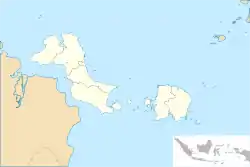Sungai Selan
Sungai Selan is a district (kecamatan) of Central Bangka Regency, in the Bangka-Belitung province of Indonesia.
Sungai Selan | |
|---|---|
 Sungai Selan Location of Sungai Selan in Bangka-Belitung | |
| Coordinates: 02°23′02″S 105°58′48″E | |
| Country | |
| Province | Bangka Belitung Islands |
| Regency | Central Bangka Regency |
| Area | |
| • Total | 789.83 km2 (304.96 sq mi) |
| Population (2020)[1] | |
| • Total | 35,495 |
| • Density | 45/km2 (120/sq mi) |
| Time zone | UTC+7 (Western Indonesia Time) |
| Area code | +62718 |
History
Sungai Selan was the initial point for the spread of Catholicism into Bangka, originating from Catholic Chinese physician Tsjen On Ngie (1795–1871) who moved from Penang into Sungai Selan in 1830, and his house gradually became a makeshift chapel with statues and prayer rooms. By 1853, a resident priest had been assigned to the area, and although the number of Catholics fluctuated (recorded at 379 in 1967, mainly Chinese migrant workers who often returned to China), a Capuchin friar was assigned to Sungai Selan in 1912, until 1918 when shifts in the tin mining industry resulted in a relocation of the mission to Pangkal Pinang. During this period, a beriberi outbreak in 1883 amongst Chinese migrant workers killed half of the congregation. The Sungai Selan mission was the first Catholic mission in the Dutch East Indies outside Java.[2][3][4]
During a Dutch administrative organization of Bangka Island in 1854, Sungai Selan was one of nine districts defined.[5] Following Indonesian independence, a reorganization of administrative divisions of Bangka in 2003 placed Sungai Selan in the Central Bangka Regency.[6]
Administration
Sungai Selan is subdivided into the urban village (kelurahan) of Sungai Selan which serves as the administrative center and twelve regular villages (desa).[7]
Economy
Agriculture and tin mining comprises the largest sources of employment in the district, with oil palm and black pepper being major commodities.[7]: 49
The district hosts a river port operated by the government-owned PT Pelindo II.[8] The port serves speedboats crossing from South Sumatra,[9] and handles around 200 tons of cargo daily.[10]
References
- "Central Bangka Regency - Bureau of Statistics". Badan Pusat Statistik Kabupaten Bangka. Statistics Indonesia. Retrieved 18 May 2021.
- Steenbrink, Karel A. (2003). Catholics in Indonesia, 1808-1942: A Documented History. KITLV Press. pp. 58, 346. ISBN 978-90-6718-141-9.
- Heidhues, Mary F. Somers (1992). Bangka Tin and Mentok Pepper: Chinese Settlement on an Indonesian Island. Institute of Southeast Asian Studies. pp. 164–165. ISBN 978-981-3035-99-7.
- Aritonang, Jan Sihar; Steenbrink, Karel (2008). "The Sharp Contrasts of Sumatra". A History of Christianity in Indonesia. Studies in Christian Mission. Vol. 35. Brill. pp. 622–623. ISBN 978-90-04-17026-1. JSTOR 10.1163/j.ctv4cbgb1.18.
- Koba dalam historiografi: sebuah penelusuran jejak sejarah Koba (in Indonesian). Badan Penerbitan Filsafat UGM. 2007. p. 79. ISBN 978-979-25-3683-6.
- LINTAS SEJARAH PERDAGANGAN TIMAH DI BANGKA BELITUNG ABAD 19-20 (PDF) (in Indonesian). Ministry of Education and Culture. 2017. p. 40. ISBN 978-602-51182-1-0.
- "Kecamatan Sungai Selan Dalam Angka 2020" (in Indonesian). Statistics Indonesia. Retrieved 19 May 2021.
- "RENCANA PEMBANGUNAN INDUSTRI PROVINSI KEPULAUAN BANGKA BELITUNG TAHUN 2019-2039" (PDF) (in Indonesian). p. 10. Retrieved 18 May 2021.
- "Lebih Dekat, Pemudik Ini Pilih Lewat Pelabuhan Sungaiselan Ketimbang Tanjung Kalian Mentok". Bangka Pos (in Indonesian). 12 June 2018. Retrieved 19 May 2021.
- Medianti, Uji Sukma (2 August 2019). "5.000 Butir Ekstasi Diamankan dari Kapal KM Bukit Raya". detiknews (in Indonesian). Retrieved 19 May 2021.